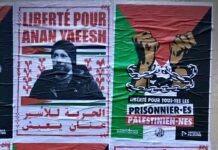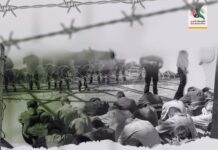
Samidoun Palestinian Prisoner Solidarity Network joins Palestinian prisoners, their organizations and institutions, those imprisoned and those released, in mourning the martyrdom and saluting the life in struggle of Palestinian national leader Sheikh Saleh al-Arouri and his comrades, including leaders Samir Afandi (Abu ‘Amer) and Azzam al-Aqra’, and the martyrs Zaki Shahin, Mohammed al-Reis, Mohammed Bshasha and Ahmed Hamoud, assassinated by the Zionist regime today, 2 January 2024, in Beirut, Lebanon.
Palestinian prisoners issued the following statement (translation via RNN):
“Prisoners’ institutions, in the name of all prisoners in the occupation’s prisons and those who have been released, mourn the national leader and martyr Sheikh Saleh Al-Arouri and his companions who were martyred alongside him.
The prisoner institutions (Prisoners and Ex-Prisoners Affairs’ Commission, Palestinian Prisoners’ Club, and The Supreme National Committee of Prisoners and Ex-Prisoners Affairs), and the national prisoner movement in the occupation prisoners, and the freed prisoners in the homeland and diaspora, mourn to our great people, the fighter, national leader, freed prisoner, and exiled, Sheikh Saleh Al-Arouri (Deputy Head of the Political Bureau of the Islamic Resistance Movement, Hamas), who ascended today after an assassination operation and a group of his companions, carried out by the Zionist occupation against him in the Lebanese capital, Beirut.
Today we mourn a leader, a national fighter, and a freed prisoner, who devoted his life for the freedom of his land and people until the last moment of his life. He spent a total of about 18 years in Zionist occupation prisons, with his last arrest being in 2007, and he was released in 2010, where the occupation court decided to release him and expel him out of Palestine, deporting him to Syria.
Mercy for the martyrs of Palestine and freedom for the prisoners.”
The assassination of Sheikh Saleh al-Arouri, deputy chair of Hamas, the Palestinian Islamic Resistance Movement, formerly imprisoned by the Zionist regime for 18 years and a national, Arab and international leader of the Palestinian struggle, reflects the same bankrupt policy of assassination that Zionism and imperialism have relied upon to undermine the cause of Palestinian and Arab liberation since the inception of the colonial project in the region.
While the occupation army is carrying out a genocidal rampage in Gaza, it has not been able to achieve military objectives or impose defeat upon the Palestinian resistance; rather, it has slaughtered over 22,000 Palestinian civilians, nearly half children, through aerial bombings and an unlimited supply of ammunition provided by the United States and its imperialist partners in the UK, France, Germany, and Canada. Instead, the Palestinian resistance has imposed serious consequences on the occupation army, forcing it to pull out ground troops, including the infamous Golani Brigade, and continues to fire missiles from all areas of Gaza.
In the Palestine Chronicle, Palestinian journalist Ramzy Baroud noted that the assassination is also an attempt by the Israeli regime “to redeem the tattered image of its intelligence community, namely the Shin Bet and the Mossad, which have failed to anticipate the October 7 attacks. The Israeli brand, in terms of intelligence, has also been greatly tarnished by the war. Killing Arouri was a direct response to that.”
From Saleh al-Arouri to Fathi Shiqaqi, Abu Ali Mustafa, Abdel-Aziz Rantisi, Sheikh Ahmed Yassin, Abu Jihad, Kamal ‘Udwan, Mohammed al-Najjar, Basil al-Kubaisi, Kamal Nasser, Wadie Haddad, Ghassan Kanafani, Mohammed Boudia, Basil al-Araj, Tariq Izzedine to Samir Kuntar; the Zionist regime relies on the assassination weapon against the liberation movement. In occupied Palestine, in Lebanon, in France, in Belgium, in Greece; this policy reflects the presence of the Palestinian people and movement everywhere in exile and diaspora. It marks a failed attempt to suppress the Palestinian and Arab people’s unquenchable will by targeting leaders, scholars, resisters and strategists.
This assassination policy includes the attacks on the Palestinian prisoners’ movement, from Ibrahim al-Rai, killed under torture, to the systematic denial of medical care to Sheikh Khader Adnan, martyred after 86 days of hunger strike, to the killing of at least seven prisoners behind bars since 7 October 2023, including Abdul-Rahman al-Bahsh, killed just yesterday by occupation prison guards. Arouri was directly involved in managing the negotiations for a prisoner exchange between the resistance and the occupation, akin to his role in the 2011 Wafa al-Ahrar exchange, and this assassination aims to prevent him from seeing and directly welcoming the prisoners freed by the Resistance. These negotiations have been suspended following the assassination.
In August 2023, in response to Zionist prime minister Benjamin Netanyahu’s assassination threats, Arouri declared: “Does the occupation expect that after its assassination threats, we will announce our surrender? No, these threats do not frighten us. We in Hamas are martyred like our people, we are arrested as they are arrested, our homes are demolished and we are being chased and pursued. This is the normal situation under the occupation. We fight because we must.”
Saleh Arouri: A Life in Struggle
Arouri, 57, was born on 19 August 1966 in ‘Aroura, near Ramallah; as a student at Hebron University, he became an early member of the Hamas movement, moving from the student Islamic bloc to the military and political development of the resistance organization. He was known as a founder of the Martyr Ezzedine al-Qassam Brigades, the armed wing of Hamas, in the occupied West Bank of Palestine as well as being a political leader and now the deputy chair of Hamas.
Seized in 1990 by Israeli occupation forces, he was initially ordered to six months in administrative detention. After his release, he was seized again in 1992, and was repeatedly ordered to administrative detention and then sentenced in the military courts for various periods of time before finally being released on 11 March 2007.
He was seized once again only three months later, on 22 June 2007 – simultaneously with the intensification on the siege on Gaza – as the occupation regime targeted the Hamas movement for thwarting the attempted coup against the government it led in Gaza and repelling the forces of the Palestinian Authority engaged in “security coordination” with the Israeli occupation forces in a decisive action consolidating the leadership of the Resistance in Gaza.
Arouri was then jailed without charge or trial under administrative detention until 2010, when he was released from occupation prisons but forcibly deported to Syria. In total, he was subjected to 20 administrative detention orders as well as multiple military court sentences; during this time, he became a leader in the Palestinian prisoners’ movement as well as a national leader.
Outside Palestine, he played a significant role in achieving the Wafa’ al-Ahrar prisoner exchange from exile, in which the Palestinian resistance liberated 1,027 prisoners jailed by the occupation, including Yahya Sinwar, Nael Barghouthi and Hussam Badran, among many others.
Unity of all Fronts
Since 2010, Arouri has lived in Syria, Turkey, Qatar and Lebanon, and has been repeatedly subjected to assassination threats by Israeli officials. He played a significant role not only in rebuilding and intensifying the Palestinian resistance in the West Bank but in building unity among resistance forces, both in Palestine and in the region more broadly. Arouri’s leadership directed the Al-Qassam Brigades toward greater involvement in unified actions and resistance brigades in multiple cities, villages and refugee camps in the West Bank, and he remained strongly committed to Palestinian national unity against the occupation.
At the same time, he was also a key advocate for unity of the resistance forces in the region and played a significant role in the reconciliation of the Hamas movement with Iran, Hezbollah and the Lebanese Resistance, and Syria, especially after his election as deputy chair of Hamas in 2017.
He worked to implement the strategy of the unity of all fronts, bringing resistance forces throughout the region together to confront Zionism and imperialism, and remaining focused on the liberation of Palestine and the Palestinian people, including securing the liberation of the Palestinian prisoners.
The importance of this strategy is apparent today in the resistance to the genocide being carried out by the Israeli regime in Gaza; the resistance confronting this genocide is not only Palestinian, but Lebanese, where the Resistance continues to strike powerful blows on the northern border; Yemeni, where the people, armed forces and AnsarAllah movement have shut down shipping to the Zionist Eilat port despite the threats of the US and its partners; Iraqi, where resistance forces hit at least four US military installations today; and throughout the region, stretching through Syria and Iran and beyond.
It is for all of these reasons that Saleh Arouri, like so many great Palestinian and Arab leaders and strategists, was targeted for imprisonment and assassination by the Zionist regime, and for all of these reasons that he is honoured and remembered as a true leader across the Palestinian political spectrum.
A US Imperialist – Zionist Crime
The assassination of Saleh al-Arouri was not solely a Zionist crime. Arouri was at least in part targeted for his role and commitment to regional resistance unity and action, something viewed by the imperialist powers as a major threat to their ongoing hegemony and control across the region. In fact, this assassination comes precisely as the U.S. and the Zionist regime reportedly agreed to “transitioning from high-intensity operations to a different phase to ‘maximize focus on high-value Hamas targets,’ as a U.S. official said following Strategic Affairs Minister Ron Dermer’s visit to Washington last week.” This statement indicates both the defeat of the Zionist forces on the ground in Gaza despite their genocidal air campaign as well as the clear willingness of the US to participate in assassinations and targeting of Palestinian resistance leaders.
The US has been backpedaling from its role in the assassination of Arouri, with US officials stating that they were unaware of the assassination and an Israeli official stating that it notified the Biden administration “as the operation was in process,” and as they announced the withdrawal of one of their aircraft carriers from the Mediterranean Sea. However, the US has repeatedly and actively sought to obtain intelligence information about Arouri’s location and activities, aside from listing him on its “Specially Designated Global Terrorist” list since 2017. In 2018, it announced a $5 million bounty for information about him, an offer it reiterated in October 2023, offering “a reward and potential re-location” to anyone providing information about the targeted resistance leader via an online appeal.
Reward up to $5 Million for Info on Hamas Key Leader
Help us find this terrorist.
If you have information on Salih al-Aruri, you could be eligible for a reward and potential re-location.https://t.co/BKuN5m48tv pic.twitter.com/sEfmJLdAUX
— Rewards for Justice (@RFJ_USA) October 24, 2023
Of course, this assassination also comes on the fourth anniversary of the U.S. assassination of General Qassem Soleimani and Abu Mahdi al-Muhandis on 2 January 2020 in Iraq, which also reflected the same goal of targeting regional resistance leaders, especially those who focused on building widespread coordination and cooperation in the fight against imperialism. It also recalls the joint CIA and Mossad assassination of Imad Mughniyyeh on 12 February 2008 in Syria; the Hezbollah leader had previously been part of the Palestinian Fateh movement and played a key role in expelling the US military from Lebanon.
The family of Georges Ibrahim Abdallah, the Lebanese Arab Communist imprisoned in France for the past 39 years, issued a statement, saying:
“The family of the prisoner Georges Ibrahim Abdallah condemns the treacherous attack carried out by the Zionist intelligence supported by the United States, as a result of which the Deputy Head of the Political Bureau of Hamas, the Palestinian leader Saleh Al-Arouri, and some of his companions were martyred in Beirut….We extend our deepest condolences to the family of the martyr leader, the family of his Hamas comrades, the Palestinian people, the family of their martyrs in Gaza and the West Bank, to all Palestinian resistance organizations, and to all parties uniting in the resistance axis. This martyrdom will never be a victory for the gang of Zionist leaders and their masters in the White House and the aggressive, collective West.”
“Will Not Break Our Will and Steadfastness”
Palestinian organizations across the political spectrum and many political forces and resistance organizations throughout the region and internationally have issued strong statements on the assassination of Arouri and his comrades.
In a statement, Hezbollah said: “We consider the assassination of Sheikh Saleh Al-Arouri and his martyred comrades in the heart of the southern suburbs of Beirut a serious attack on Lebanon, its people, security, sovereignty, resistance, and the highly symbolic political messages it carries. We, in Hezbollah, affirm that this crime will never pass without a response and punishment. Our resistance is steadfast, proud, committed to its principles, and bound by the obligations it has undertaken.”
Ismail Haniyeh, the chair of the Political Bureau of Hamas, said: “This is the history of the resistance and the movement: following the assassination of its leaders, it becomes even stronger and more determined.” Izzat al-Rishq, a member of the Political Bureau, reiterated: “The cowardly assassinations carried out by the Zionist occupation against the leaders and symbols of our Palestinian people inside and outside Palestine, will not succeed in breaking the will and steadfastness of our people, or undermining the continuation of their valiant resistance, and they prove once again the failure of this terrible enemy to achieve any of its aggressive goals in the Gaza Strip.”
At the same time, Zionist officials have boasted about the assassination, with Israel’s notorious ambassador to the United Nations, Gilad Erdan – previously infamous for his role in directing the torture and abuse of Palestinian prisoners as “Minister of Public Security” and in leading international campaigns of defamation and criminalization against Palestinian and solidarity organizations around the world – declared, “I congratulate the Israeli army, Shin Bet, Mossad and security forces on the assassination of Hamas Terrorist leader Saleh Al-Arouri.” As Erdan sits in the United Nations, a body purportedly committed to international peace, on behalf of a genocidal regime, he not only lobbies for more killing but boasts about the assassination of those who resist.
The assassination of Saleh al-Arouri and his fellow leaders and fighters today in Beirut only undermines the defeat and desperation of the occupation forces to declare “an achievement” over the Resistance forces, who have been striking severe blows against invading forces everywhere in Gaza, leading to the withdrawal of multiple brigades. The occupation forces are engaged in a genocidal campaign of aerial bombing and siege against the Palestinian population – and are demanding the expulsion of the Palestinian people — in Gaza, but have been entirely unable to uproot, let alone destroy, the resistance that defends the land and people. Therefore, we are seeing drone assassinations in Beirut, murderous beatings in Zionist prisons, and the torture and abuse of Palestinian civilians in Gaza, all of which underline the racist and colonial nature of the Zionist regime as well as its role as a military base for imperialist powers, especially the United States.
As has been the case for so many such criminal assassinations, they will not achieve the goal of killing the resistance, nor the Palestinian and Arab revolution against Zionism and imperialism. They will not gain an illusory victory through another assassination of a widely respected and beloved leader and struggler, but only inspire greater resistance and struggle toward the defeat of the Zionist regime, the liberation of Palestine from the river to the sea, and the liberation of the Arab people and the region from imperialism and its agents and collaborators. The message for which Saleh al-Arouri was targeted, the symbolism that he holds and the goals for which he gave his life remain, live on and become closer: commitment to unity, to the liberation of the prisoners, the land and the people, and intensification and development of resistance until victory, return and liberation.
Discover more from Samidoun: Palestinian Prisoner Solidarity Network
Subscribe to get the latest posts sent to your email.






